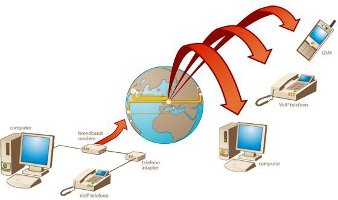If Only VoIP Would Be Fully Deregulated . . .
 This is actually like a repost of one of the many articles I had written about the subject of having Voice over Internet Protocol (VoIP) as an affordable service that i-cafés can offer to the public if our government would only have it fully deregulated. The subject cropped up again when I attended a forum about a World Bank study on proposed policies that could stimulate universal access and service to ICT in the country. In the open forum, I mentioned that full deregulation based on this contact form in the use of VoIP could also help in increasing internet connectivity and that it would benefit many Filipinos especially those with relatives living and/or working abroad. I likewise asked why our telcos would allow the call centers to use Internet Telephony Service Providers (ITSPs) other than themselves, an activity that i-cafés could not do. This is an issue that may take time to resolve but participants in the forum seem to agree on the benefits to the people if VoIP would be fully deregulated in the country. You can also hop over to this website for the best and affordable voip services.
This is actually like a repost of one of the many articles I had written about the subject of having Voice over Internet Protocol (VoIP) as an affordable service that i-cafés can offer to the public if our government would only have it fully deregulated. The subject cropped up again when I attended a forum about a World Bank study on proposed policies that could stimulate universal access and service to ICT in the country. In the open forum, I mentioned that full deregulation based on this contact form in the use of VoIP could also help in increasing internet connectivity and that it would benefit many Filipinos especially those with relatives living and/or working abroad. I likewise asked why our telcos would allow the call centers to use Internet Telephony Service Providers (ITSPs) other than themselves, an activity that i-cafés could not do. This is an issue that may take time to resolve but participants in the forum seem to agree on the benefits to the people if VoIP would be fully deregulated in the country. You can also hop over to this website for the best and affordable voip services.
In a country like the Philippines where millions of its citizens are living and/or working abroad, Voice over Internet Protocol or VoIP is a mature technology which could have been a viable and lucrative addition to the services offered by Internet cafés. But for some reasons, definitely not technical, our countrymen cannot avail of this technology which could be very affordable if only the i-cafés will be allowed to offer the service to the public. I am not speaking of the Skype or YM Voice which are PC to PC VoIP services and can be used for free by an i-café customer. I am talking here about a customer using a PC or a VoIP phone in an Internet café to call a landline or a cellphone of a friend or relative living or working abroad and vice-versa. While free PC to PC voice calling (Skype, YM Voice, etc.) are practical for appointed or scheduled meetings online, such service cannot be used for emergencies or other situations when the other party is not on his PC.
So what is preventing the i-cafés to openly offer VoIP service? I should say, many and majority of the reasons have something to do with the numerous NTC regulations on the matter. One is the classification of VoIP as a Value-Added Service (VAS) requiring the provider to register with the agency as such. Another NTC regulation requires business establishments offering outgoing and incoming calls to register as Public Calling Office (PCO) before they can offer the service to the public. There is also the requirement for NTC type-approval of any Customer Premise Equipment (CPE) that will be connected to the facilities of a telco. Last but not least is the fact that the Internet Service Providers (ISPs) in the country are also the telcos who can terminate the Internet connection of i-cafés once any violation of the aforementioned NTC regulations are found.




If I remember correctly, sometime in 2000 – 2001, a news was printed on a national broadsheet (can’t remember if it was PDI or philstar) that PLDT will be converting it’s current subscribers to be VOIP ready for and additional amount on top of their monthly subscription fee. Then all the issues regarding “legalities” of VOIP implementation came out.
I think the main reason (only my opinion) why VOIP can’t be implemented is because, as the usual case, TelCos are controlling NTC. VOIP could possibly have a negative impact on current standard phone rates (local and international calls). And since TelCos, back then, were the one to implement VOIP, that has a tendency to ‘kill their own business’. As I’ve said, this is only my opinion based on the readings that I had back then.
I hope someone would, again, hammer on NTC to look into this case.
.-= dodimar´s last blog ..Reflection on Luke 11:5-13 =-.